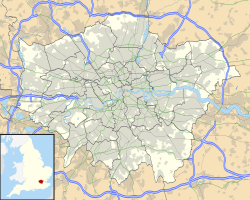RAF Kidbrooke facts for kids
Quick facts for kids RAF Kidbrooke
|
|||||||
|---|---|---|---|---|---|---|---|
| Kidbrooke, London in England | |||||||
|
Shown within Greater London
|
|||||||
| Coordinates | 51°27′50″N 0°01′37″E / 51.464°N 0.027°E | ||||||
| Type | Royal Air Force station | ||||||
| Site information | |||||||
| Owner | Ministry of Defence | ||||||
| Operator | Royal Air Force | ||||||
| Site history | |||||||
| Built | 1917 | ||||||
| In use | 1917-1965 | ||||||
| Airfield information | |||||||
| Elevation | 31 metres (102 ft) AMSL | ||||||
|
|||||||
RAF Kidbrooke was a former Royal Air Force (RAF) base located in Kidbrooke, south-east London. It was an important site for the RAF for many years. The base operated from 1917 until 1965. It was mainly used for storing supplies, maintaining equipment, and training personnel.
Contents
History of RAF Kidbrooke
The base started in 1917 as a storage area for the Royal Flying Corps. This was before the RAF was created. It was built near Kidbrooke railway station. Large warehouses and offices were constructed. They stretched for about 914 meters (1,000 yards) along the railway lines. The site had its own train tracks for moving goods. In December 1917, Lt. Col. William Henry Lang took command.
The Royal Flying Corps became the RAF on April 1, 1918. Kidbrooke was then called No 1 Stores Depot in 1920. Later, its name changed to No 1 Equipment Depot in 1937. In 1938, it became No 1 Maintenance Unit. The base stopped being a main storage depot in 1947. However, its buildings were still used by other RAF units.
RAF Kidbrooke During World War II
During the Second World War, RAF Kidbrooke became even more important. It was expanded to include a barrage balloon depot. These balloons were used to protect London from enemy aircraft flying low.
The base was also home to:
- No 1 Balloon Centre
- 901 Squadron (a barrage balloon squadron)
- No 2 Installation Unit, which built and fixed Chain Home radar station masts. These radar stations helped detect enemy planes.
From 1942 to 1945, a gliding school for the Air Training Corps operated nearby. This was No. 141 Gliding School RAF. After the war, the radar unit moved to RAF West Drayton.
Training and Movements at RAF Kidbrooke
From 1949 to 1953, the Joint Services School for Linguists was at Kidbrooke. This school taught servicemen and women to speak Russian. This was a very useful skill during the Cold War.
In 1954, the RAF Movements School was formed here. This school trained people from all parts of the military. They learned how to move cargo and equipment. The school had 47 staff members. It offered about 25 different courses. Some courses were short, lasting less than a week. Others, like the basic recruit course, lasted 17 weeks. Over 1,900 people were trained each year. In 1963, the school moved away.
RAF Kidbrooke was also home to No 4 MT Squadron. MT stands for Motor Transport. This squadron had military and civilian staff. They used many types of vehicles, including large trucks. They were responsible for moving equipment, mostly in southern England. They also provided vehicles for the London Docks. All RAF personnel left the squadron in 1967. The civilian staff and vehicles moved to Woolwich Arsenal when RAF Kidbrooke closed.
RAF Kidbrooke Today
After the base closed, much of the land was used for new housing. The Ferrier Estate was built there between 1968 and 2012. In the 1980s, a new road, the Rochester Way Relief Road, was built across the northern part of the site. This road carries the A2 highway.
The area where the Kidbrooke training facility once stood is now home to Thomas Tallis School. In 2008, a special plaque was placed at the school. It remembers the RAF Linguists' Association. This plaque was rededicated in 2014.
Part of the land where the glider school was located is now occupied by The Halley Academy. This school was known as Kidbrooke School from 1954 to 2011.
 | James B. Knighten |
 | Azellia White |
 | Willa Brown |


